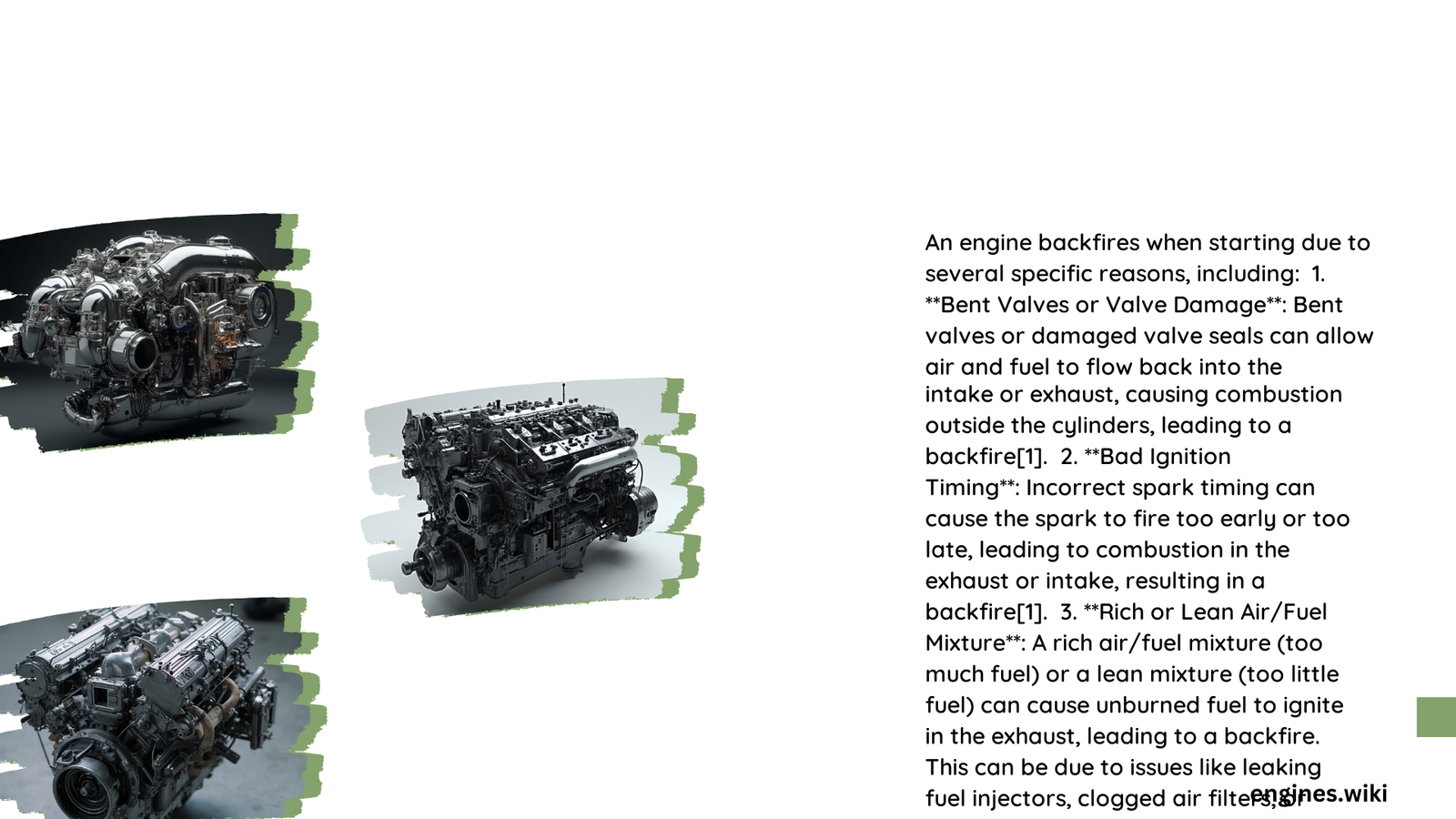Engine backfires when starting can be alarming and potentially damaging to your vehicle. This issue occurs when fuel combusts outside the engine’s combustion chambers, often in the intake or exhaust system. Common causes include fuel mixture problems, ignition timing issues, and air intake complications. Understanding these factors is crucial for diagnosing and resolving backfire issues, ensuring your engine’s longevity and performance.
What Are the Primary Causes of Engine Backfires When Starting?
Engine backfires during startup can stem from several factors:
- Fuel Mixture Imbalances
- Ignition Timing Discrepancies
- Air Intake System Problems
- Faulty Valves or Exhaust System Issues
Let’s delve deeper into each of these causes:
1. Fuel Mixture Imbalances
The air-fuel ratio is critical for proper engine function. Imbalances can lead to backfires:
- Lean Mixture: When there’s too much air and not enough fuel, the mixture burns slowly. This can result in unburned fuel entering the exhaust system and igniting there.
- Rich Mixture: Excess fuel may not burn completely before reaching the exhaust, leading to combustion in the exhaust system.
Causes of fuel mixture imbalances include:
- Clogged fuel injectors
- Failing fuel pump
- Fuel system pressure leaks
- Malfunctioning oxygen sensors
- Dirty air filters
2. Ignition Timing Discrepancies
Proper ignition timing is crucial for efficient combustion. Timing issues can cause backfires in two ways:
- Early Ignition: If the spark fires too soon, it can ignite the fuel mixture before the intake valve closes completely, causing a backfire in the intake manifold.
- Late Ignition: Delayed spark can result in unburned fuel entering the exhaust system, where it may combust.
Factors affecting ignition timing include:
- Worn distributor components (in older vehicles)
- Faulty crankshaft position sensor
- Damaged timing belt or chain
- Computer control module issues
3. Air Intake System Problems
The air intake system plays a vital role in engine performance. Issues here can lead to backfires:
- Vacuum Leaks: Allow excess air into the system, disrupting the air-fuel ratio.
- Damaged Intake Manifold: Can cause improper air distribution to cylinders.
- Clogged Air Filter: Restricts airflow, affecting the air-fuel mixture.
4. Faulty Valves or Exhaust System Issues
Problems with valves or the exhaust system can also cause backfires:
- Bent or Damaged Valves: Prevent proper sealing, allowing fuel mixture to escape.
- Exhaust Leaks: Can introduce oxygen into the hot exhaust gases, causing combustion.
- Catalytic Converter Issues: A clogged converter can cause exhaust backpressure, leading to backfires.
How Can You Diagnose Engine Backfire Issues?

Diagnosing backfire issues involves several steps:
- Listen Carefully: Note when the backfire occurs (during startup, acceleration, or deceleration).
- Check Engine Light: If illuminated, use an OBD-II scanner to read error codes.
- Inspect Spark Plugs: Look for signs of wear, damage, or incorrect gap.
- Examine Fuel System: Check for leaks, clogged injectors, or fuel pump issues.
- Test Ignition System: Verify proper spark timing and distribution.
- Inspect Air Intake: Look for vacuum leaks or damaged components.
- Assess Exhaust System: Check for leaks or damage.
What Are the Steps to Resolve Engine Backfire Problems?
Resolving backfire issues depends on the underlying cause. Here’s a general approach:
- Address Fuel System Issues:
- Clean or replace fuel injectors
- Repair fuel leaks
-
Replace faulty fuel pump if necessary
-
Correct Ignition Timing:
- Adjust timing to manufacturer specifications
- Replace worn distributor components (if applicable)
-
Check and replace faulty sensors
-
Repair Air Intake System:
- Fix vacuum leaks
- Replace damaged intake manifold gaskets
-
Clean or replace air filter
-
Fix Exhaust System Problems:
- Repair exhaust leaks
- Replace damaged catalytic converter
-
Ensure proper oxygen sensor function
-
Address Valve Issues:
- Adjust valve clearance if necessary
-
Replace damaged valves
-
Perform General Maintenance:
- Change spark plugs
- Replace air and fuel filters
- Conduct regular tune-ups
How Can You Prevent Future Engine Backfires?
Preventing backfires involves regular maintenance and attention to your vehicle’s needs:
- Follow Maintenance Schedule: Adhere to manufacturer-recommended service intervals.
- Use Quality Fuel: Choose high-quality fuel appropriate for your vehicle.
- Replace Filters Regularly: Change air and fuel filters as recommended.
- Address Issues Promptly: Don’t ignore check engine lights or unusual sounds.
- Regular Inspections: Have a professional inspect your vehicle periodically.
What Are the Potential Consequences of Ignoring Engine Backfires?
Ignoring engine backfires can lead to several problems:
- Engine Damage: Repeated backfires can damage valves, pistons, and exhaust components.
- Reduced Performance: Backfires often indicate inefficient combustion, reducing power and fuel economy.
- Catalytic Converter Failure: Unburned fuel can overheat and damage the catalytic converter.
- Safety Hazards: In extreme cases, backfires can cause fires or explosions.
- Increased Emissions: Improper combustion leads to higher pollutant levels.
Conclusion
Understanding why engine backfires when starting is crucial for maintaining your vehicle’s health and performance. By recognizing the causes, diagnosing issues accurately, and taking prompt corrective action, you can prevent damage and ensure your engine runs smoothly. Regular maintenance and attention to your vehicle’s needs are key to preventing backfires and other engine problems.
Remember, if you’re unsure about diagnosing or repairing engine issues, it’s always best to consult a professional mechanic. They have the tools and expertise to accurately identify and resolve complex engine problems, ensuring your vehicle’s longevity and your safety on the road.
References:
1. Custom Complete Automotive: 5 Reasons an Engine Could Backfire
2. Carr Subaru: What Makes an Engine Backfire?
3. Mike Shaw Subaru: 4 Causes of Engine Backfires
